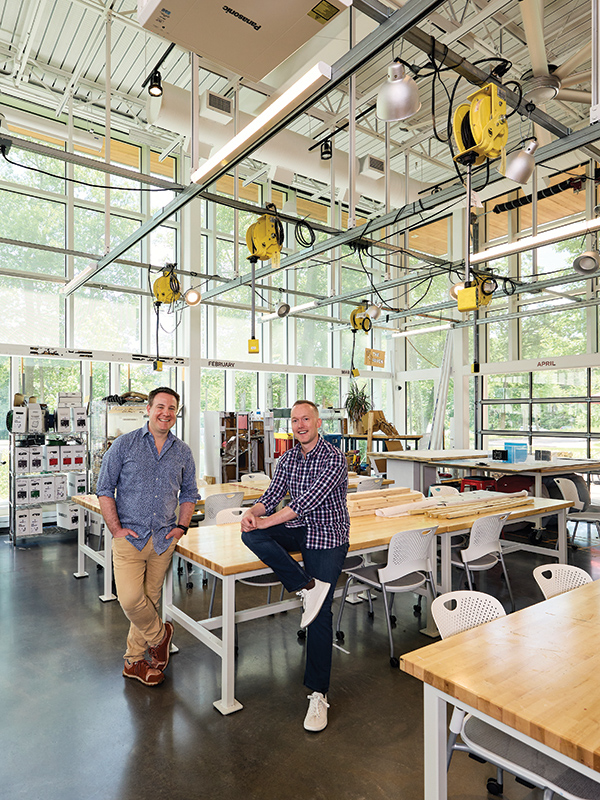The Age of AI: Seven Things Entrepreneurs Need to Know

The rise of generative artificial intelligence—which harnesses data to generate text, imagery, and audio with a few prompts—is poised to become an entrepreneurial game-changer. Ask language processing tool ChatGPT to compose an email, and it will spit one out. Command art generator DALL-E 2 to create an image of Jeff Bezos playing the accordion in a tutu for an ad campaign, and it will oblige.
These systems are automating creative and other work with enormous ramifications. There are pros: accelerated creativity, egalitarian tech for non-software engineers. There also are downsides, ranging from the politically sinister—systems pulling biased data to spread propaganda—to the economically devastating, such as the displacement of humans from creative jobs.

“It’s the new electricity,” says Rich Palmer MBA’16, managing director of Boston-based Launchpad Venture Group and former AI entrepreneur, on the transformative power of generative artificial intelligence.
“Much like a cell phone, AI is going to change how we interact with our computers and with each other in meaningful ways—and, if you don’t have an understanding of what generative AI can do and what its limitations are, you’re going to be left in the dust,” says Jonathan Griffiths, director of Babson College’s Weissman Foundry, an open-door design and prototyping studio exploring AI.
“At this point, if you have a startup and you don’t have a generative AI strategy, your board will be really unhappy with you, because that’s what everybody expects—in the same way that, if you didn’t have a social strategy 15 years ago, it was a bad thing,” says Joshua Herzig-Marx MBA’08, a coach for early founders.
“It’s the new electricity.”
Rich Palmer MBA’16, managing director, Launchpad Venture Group
Babson faculty are quickly incorporating AI into the curriculum. Ruth Gilleran and Clare Gillan are co-faculty directors of Digital Technologies for Entrepreneurs, a required course for all Babson undergraduates. The course serves as an introduction for Technology Entrepreneurship, a new concentration launched last fall.
“We live in a time of tremendous disruption, and the pace of change has only accelerated,” Gillan says. “I want (students) to land on the right side of that continuous change.”
Here, Babson experts—including faculty and alumni—offer their insights and advice with seven things entrepreneurs should know at the dawn of the Generative AI Era.
1. It will enable non-engineers to innovate in new ways.
While much has been written about AI displacing humans, there is an upside: Now, workers who have never before written code could use generative AI to produce it.
“It further democratizes the entrepreneurial process,” Gilleran says.

“For tech startups, this will be a huge factor: the opening up of programming to people who don’t have technical backgrounds,” says Thomas Davenport, the President’s Distinguished Professor of Information Technology and Management. “From an entrepreneurship standpoint, it lowers the barriers for tech expertise to design new products. It’s a good thing for entrepreneurs.”
Right now, Davenport thinks prompt engineering is one of the most in-demand AI jobs, especially in visual effects fields. These people know how to nudge systems to generate just the right, complex type of outputs (at least until generative AI gets even smarter and can do so itself).
“You need people who are ‘AI whisperers’—people who understand how these systems work and how to get the best out of them,” he says.
But, as AI rapidly changes over the next five years, prompt engineering might become obsolete.
“AI is going to be able to take what you’ve implied in your comments and statements and generate what it thinks is the best response, and it’ll likely be close to what you get right now using a very engineered-level prompt,” Griffiths says. “I’m excited to see that kind of simplification of the technology. It’s going to increase the wider range and usage of that tech.”
“From an entrepreneurship standpoint, it lowers the barriers for tech expertise to design new products. It’s a good thing for entrepreneurs.”
Thomas Davenport, the President’s Distinguished Professor of Information Technology and Management
2. It should only be used in certain instances.
New technology is beguiling, but it should also be deployed wisely.
“Judgment is the big challenge (with generative AI), which is always one of the hardest things for any businessperson,” Herzig-Marx says. “There’s no reason to think that whatever pops out of ChatGPT or a text-to-image service is going to be something you would actually want to use.”

Generative AI can be incredibly useful for lesser tasks, but bigger asks? Think twice.
“Would I want to use it to design the interface for my new iPhone app? Probably not,” Herzig-Marx adds. “That seems really lazy: And, what’s the point in me as a founder if I don’t have strong opinions about that? But, if I need to run an ad on Facebook or need 10 different versions of the same thing for copy, absolutely. I’ll use it for non-mission-critical things.”
Moreover, generative AI isn’t always accurate.
“The technical phrase in the industry is that generative AIs can ‘hallucinate.’ It can make up facts, which I think is such a charming way to describe it. If you don’t have the experience, the judgment, you’re not going to know,” Herzig-Marx warns.
He points to a recent case wherein a law firm submitted a brief using ChatGPT.
“It hallucinated a number of cases, which did not go over well with the judge, who was unimpressed that they submitted basically a false brief,” he says. “Judgment is really the hard thing, and increasingly, I think that’s what’s going to be missing.”
“We live in a time of tremendous disruption, and the pace of change has only accelerated.”
Clare Gillan, co-faculty director of Digital Technologies for Entrepreneurs
3. Knowledge and content management will be transformed.
Content creation tasks that occupy an outsized amount of startup employees’ time, from composing training manuals to creating leave policies, could be expedited using generative AI—perhaps creating a universal set of standards while also freeing up bandwidth.
“If a startup needs to write a policy for paternity or sick leave, or if they need to do a policy for travel reimbursement, or all sorts of other kinds of non-business critical things?” Herzig-Marx says. “I see a lot of people using it for that.”
The financial sector will benefit, too. While generative AI can’t customize your stock portfolio yet, it could be helpful finding answers to general process questions, such as how to set up a trust.
In an article for Forbes, Davenport noted how Morgan Stanley is using OpenAI’s GPT-4 to comb 100,000 of its internal documents for investment recommendations, “fine-tune-training” the system to use it.
“Generative AI will rejuvenate the job of a knowledge manager,” he says. “This fine-tune-training solves, to a large degree, the hallucination problem, and knowledge can be private to a particular company. I think there are a lot of advantages to doing it for educating your frontline people and customer service applications.”

4. It will generate instant feedback, allowing entrepreneurs to assess viability quickly.
Entrepreneurs have novel ideas. Software engineers execute them. It’s a time-consuming loop. Generative AI will fuse and accelerate the prototyping phase.
“I could see (entrepreneurs) working with generative AI to solve the problems that they may not necessarily have the skills to solve right now,” Griffiths says.

He notes that many budding entrepreneurs “lack engineering-level skills and are always looking for a technical co-founder. They’re looking for other people to help launch their company. While I don’t think that generative AI is going to totally replace that, I think it can help them jump initial entrepreneurial hurdles, helping them see if something’s even possible.” In essence: It’s great for dry runs.
“Generative AI enables the rapid prototyping of entrepreneurial ideas: literally a visualization and expression of an entrepreneurial idea that you can show to a target customer. You can get feedback on whether you’re on a compelling path and creating value, or whether your idea is a dud,” says Associate Professor Erik Noyes, who teaches Entrepreneurial Opportunities in AI.
“You don’t have to spend weeks and engage with Photoshop. You can literally whip out approximations of product concepts in hours by yourself, with yourself in a creative cockpit.”
“I could see (entrepreneurs) working with generative AI to solve the problems that they may not necessarily have the skills to solve right now.”
Jonathan Griffiths, director, Weissman Foundry
5. Beware of bias.
Generative AI is merely a means to an end, not an end in itself, says Associate Professor Davit Khachatryan, who specializes in machine learning and data science.

“The outputs of generative AI should be taken with a grain of salt,” he warns. “A typical user of generative AI doesn’t yet understand what happens under the hood and how those outputs get produced: Those are predictions produced by a large language model—an algorithm,” he says. “Taking the results of generative AI at face value is like the blind following the blind. Today’s entrepreneur, or any user of generative AI, needs to have an above-average understanding of how these tools work—and I think that’s where we analytics and data-science educators have a crucial role to play.”
“‘Generative’ literally means to generate new data based on the analysis and quote-unquote ‘understanding’ of the existing data,” Noyes says. “If the existing data is biased, there’s a strong likelihood that what’s generated can also be biased. You have to look at anything you’re doing in generative AI through the critical lens of ‘How could this just be re-expressing bias?’ ”
“You don’t have to spend weeks and engage with Photoshop. You can literally whip out approximations of product concepts in hours by yourself, with yourself in a creative cockpit.”
Erik Noyes, associate professor of entrepreneurship, who teaches Entrepreneurial Opportunities in AI
6. Regulatory concerns could constrain creativity.
To that end, Sam Altman, CEO of ChatGPT creator OpenAI, has urged international regulation of generative AI. At a Senate hearing in May, he proposed the creation of an agency to issue licenses for the development of large-scale AI models, safety regulations, and tests that AI models must pass before public release. And, while many worry about the havoc that generative AI could wreak—from replacing human jobs to infringing privacy regarding data usage to spreading misinformation—there’s a downside to regulation, too.
“When the front-runner (OpenAI) pushes for regulation, it opens up a question of whether anyone else can swim in the wake or not, and if anybody else can catch up again,” Palmer says. “I’m worried about not just the uses of it, but the governmental structural components of maintaining an innovative pace for our startups if the big players box them out.”
“Overly relying on the seeming ‘magic’ that is provided by generative AI is not going to work. To have your leg up, you still need to put your creative hat on and keep it on at all times.”
Davit Khachatryan, associate professor of statistics, who specializes in machine learning and data science
7. Humans still matter.
Generative AI is a tool, which, for now, remains wielded by humans.
“Overly relying on the seeming ‘magic’ that is provided by generative AI is not going to work,” Khachatryan says. “To have your leg up, you still need to put your creative hat on and keep it on at all times.”

Entrepreneurs must remember that humans still retain critical-thinking abilities and critical-thinking power, he says.
“Generative AI has the amazing ability to learn from huge data repositories and create human-like output, be it text, images, or sound. As impressive as all that is, there’s a catch,” Khachatryan adds. “That catch is that it currently has no mechanism in place to evaluate the quality, meaningfulness, or effectiveness of these responses. I don’t think that one should get overexcited about how human-like the responses are because human-like, at the end of the day, doesn’t translate necessarily into meaningful.”
In human hands, though, AI is a powerful tool for entrepreneurs.
“Technology continues to propel us forward,” Gillan says. “(AI) helps with the entrepreneurial process, but it is also an entrepreneurial opportunity.”
Posted in Insights



